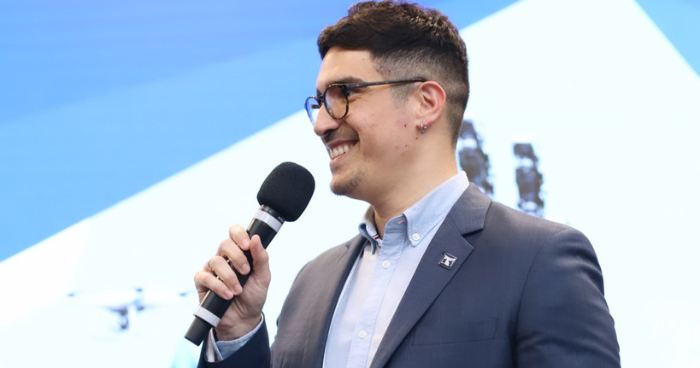FEIT academics win University of Melbourne Excellence Awards
A number of academics from the Faculty of Engineering and Information Technology (FEIT) have received 2023 University of Melbourne Excellence Awards for their exceptional accomplishments.
Teaching Excellence Awards:
- Edward Brown Award for Teaching Excellence: Eduardo Oliveira
Eduardo Oliveira, Senior Lecturer in the School of Computing and Information Systems (CIS) has significantly influenced the advancement of innovative teaching practices. He has succeeded in providing students with professional tools and guidelines to make them job-ready by focusing on problem-based learning, and in promoting the use of responsible AI in his subjects.
"I believe education goes beyond merely sharing knowledge; it's about nurturing curiosity, fostering critical thinking and unlocking each student's potential in a supportive, respectful and inclusive manner," Dr Oliveira said.
With great passion for teaching and pedagogical innovations, Dr Oliveira has earned awards such as the CIS Teaching and Learning Excellence Award and the FEIT Kelvin Medal, which reflects his positive impact on student learning and course redesign.
Dr Oliveira believes that "it's all about bringing together a mix of empathy, enthusiasm, passion, adaptability and a lifelong commitment to learning, while creating safe and inclusive learning environments".
Eduardo Oliveira.
- Norman Curry Award for Innovation and Excellence in Educational Programs: The Centre for Digital Transformation of Health – Dr Douglas Pires, Dr Daniel Capurro and Associate Professor Brian Chapman from CIS and others from the Faculty of Medicine, Dentistry and Health Sciences (MDHS).
The short course, Learning Health Systems, was developed by the Centre for the Digital Transformation of Health, a collaboration between CIS and MDHS. This short course seeks to provide training for clinicians and other health care professionals about the learning health systems’ approach to continuous improvement.
This course walks students through an example, such as diabetes and high risk of hospital admission, where students access and analyse clinical data, build a machine learning model to predict adverse outcomes, ideate and prototype solutions and design an evaluation plan.
“In a learning health system, we continuously collect data about clinical practice through information systems and analyse that data to generate knowledge about what is working well and what is not,” Dr Capurro said.
"That new knowledge is used to design changes in the way we work or innovate that will lead to changes in clinical practice, in order to evaluate them and continue with the improvement cycle."
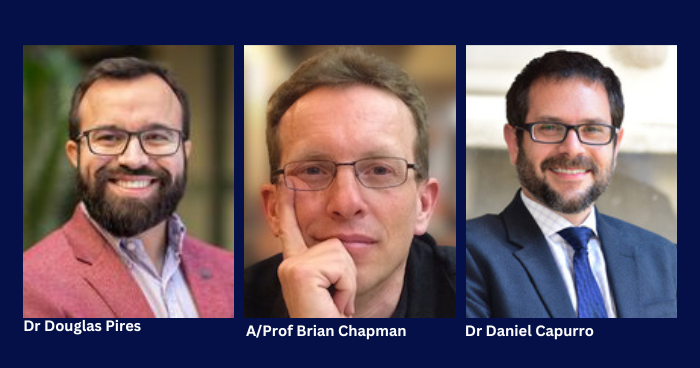
- Norman Curry Award for Innovation and Excellence in Educational Programs: Musculoskeletal Team, Physiotherapy – Dr Antony Chacon and Dr Hasan Ferdous from CIS, with others from MDHS.
The award encompassed multiple themes directed toward enhancing the educational experience for physiotherapy students and teachers.
A collaboration between physiotherapy and Human-Computer Interaction (HCI) academics led to the successful design and trial of the SpinalLog, a deformable interaction device for teaching spinal manipulation, created by Dr Chacon.
“SpinalLog enables authentic force and compliance sensation of the lumbar spine and provides immediate and accurate visual feedback.
"I created a simulator for the human back. This simulator was tailored to facilitate the teaching of manual skills required for mobilisation of the spine," Dr Chacon said.
Dr Ferdous contributed by developing an innovative visualisation tool using projection-based augmented reality mapping to turn a human body into an interactive canvas in real time, allowing students to observe the dynamic changes in the anatomical configuration of the body.
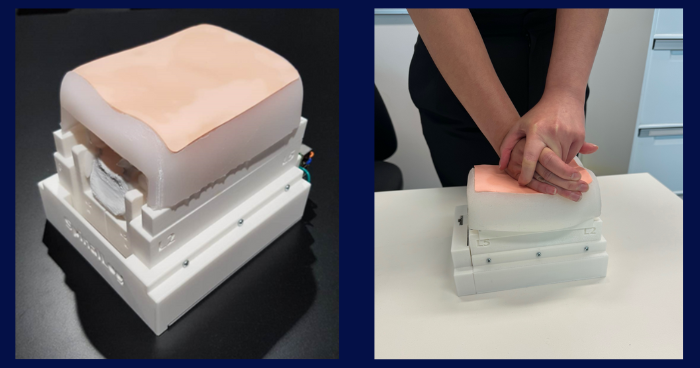 SpinalLog current state.
SpinalLog current state.
Research Excellence Awards
- Award for Excellence in Mid-Career Research Achievements: Dr Renata Borovica-Gajic
Renata Borovica-Gajic, an ARC DECRA Fellow and Senior Lecturer in data analytics at CIS, has achieved noteworthy advances in her study of data management and artificial intelligence (AI). Her work uses AI and innovative machine learning techniques to advance databases by automating complex tasks that presently require expensive, specialized expertise, making them accessible to non-experts.
“The research allows users to interactively search for insights buried in the data, without knowing what the insight is. It focuses on creating the next generation of self-driving databases for seamless data exploration.
“This cost-effective solution incorporating AI is extremely valuable as it can potentially be used to improve business processes, reduce production costs, improve the efficiency of institutions such as hospitals, or lead to new discoveries in scientific disciplines,” Dr Borovica-Gajic said.
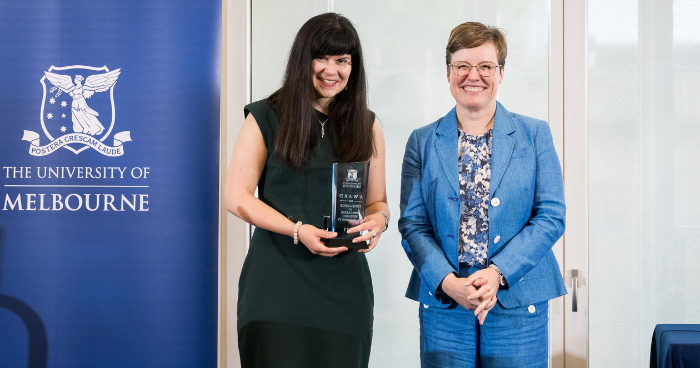 Dr Renata Borovica-Gajic and University Provost Professor Nicola Phillips.
Dr Renata Borovica-Gajic and University Provost Professor Nicola Phillips.
- Award for Excellence in Enabling Research: Materials Characterisation and Fabrication Platform Team – Dr Elena Taran, Dr Tian Zheng, Dr Anders Barlow, Dr Darryl Johnson, Paul Brannon, James Daniel Smith and Raveen Wijesuriya from FEIT’s Department of Chemical Engineering.
This team has made a significant difference to the University’s research outcomes through their leadership, expertise and commitment to enabling research in the Materials Characterisation and Fabrication Platform (MCFP).
MCFP enables access to state-of-the-art equipment and expertise aimed at supporting research and development across engineering, physics and life sciences.
"The aim of our research is to enhance the outcomes of cutting-edge research projects, ranging from immunology and cancer research to batteries and fabrication of nanoscale devices, to the development of novel materials tackling antimicrobial resistance to studies on heritage conservation," Dr Taran said.
"The MCFP team is training and empowering the current and next generation of Australian scientists by guiding and supporting students and researchers, creating opportunities to learn, collaborate and accelerate research".
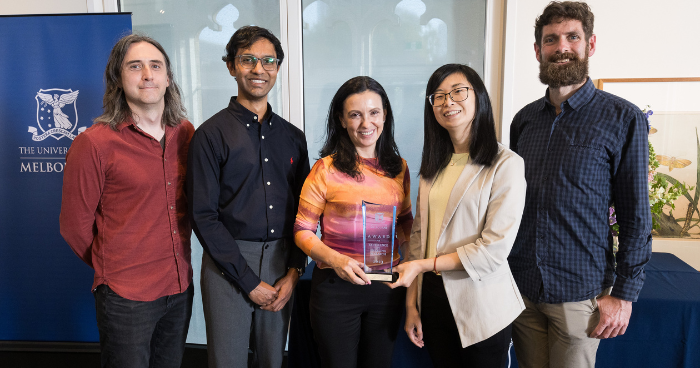
From left: Paul Brannon, Raveen Wijesuriya, Dr Elena Taran, Dr Tian Zheng and Dr Darryl Johnson.
- Award for Excellence in Interdisciplinary Research: Mathematical and computational modelling to reduce the burden of skin pathogens in Indigenous communities – Associate Professor Nic Geard, Dr Cameron Zachreson, Ms Nefel Tellioglu from CIS, with others from MDHS and the Faculty of Science.
This cross-Faculty research across CIS and MDHS was centered around understanding the drivers of poor skin health and engage with stakeholders to translate these insights to improve public health.
In impoverished environments, skin pathogens offer a significant and persistent health risk, particularly to Indigenous populations in Australia, New Zealand and the Asia-Pacific region.
“Our team has overturned dogmas regarding how the infection-causing bacteria transmits and has developed tools to measure and inform the design of new studies," Associate Professor Geard said.
"With 22 published papers and reports, our research has been communicated to government and community stakeholders."
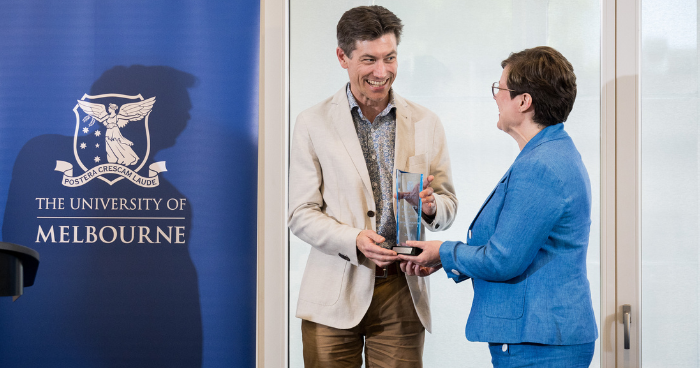
Associate Professor Nic Geard and Professor Nicola Phillips.
For more information: https://melbourne-cshe.unimelb.edu.au/awards/university-of-melbourne-awards-for-excellence
